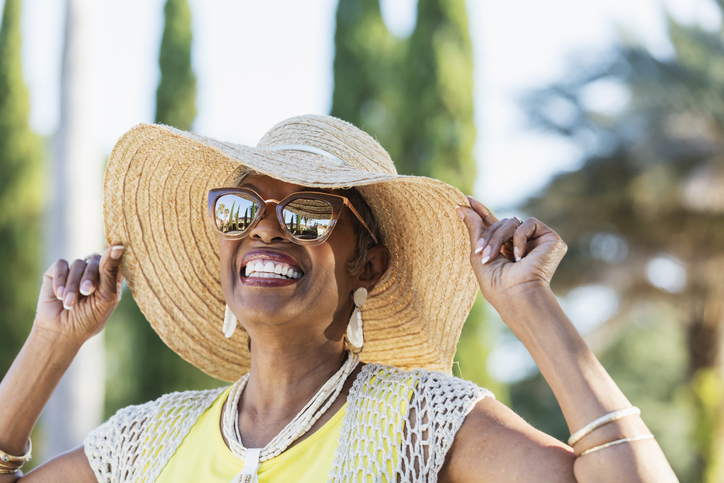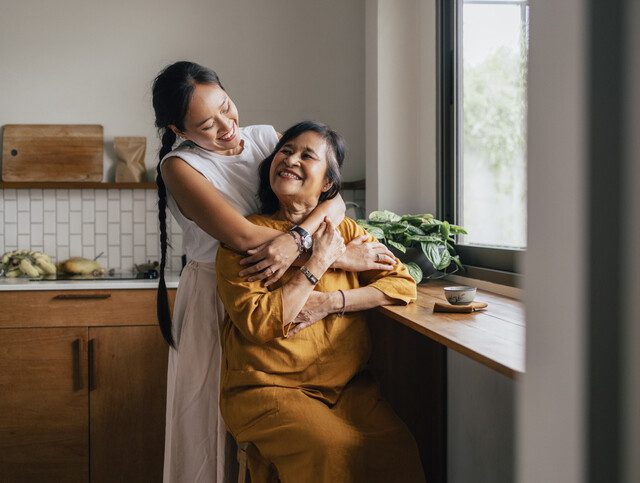Getting outside and staying active in the warm weather are great ways to maintain your overall health and well-being. However, enjoying the outdoors when the temperature is hot can come with some additional heat-related health risks that seniors should keep in mind. To help you stay prepared, we’ve compiled a list of common risks seniors may face in warmer weather and share our best hot weather safety tips for seniors.
What Temperature is Too Hot for Seniors?
Heat affects every person differently, and personal tolerance is based on several factors, such as chronic health conditions and age. Generally, older adults may find themselves more at risk for heat-related illnesses due to a decline in temperature-regulating functions that come naturally with age.
While ailments like dehydration and heat stroke are more commonly associated with extreme heat, research suggests that any temperature above 80 degrees Fahrenheit can be dangerous for seniors. To ensure you’re taking the right precautions in the heat, it’s important to talk with your doctor to understand your specific heat tolerance levels.
Common Risks of Summer Heat for Seniors
Heat-related illnesses are a serious threat to the health of older adults, especially when partaking in summer activities. Here are some common summer ailments to stay aware of while you enjoy the weather
Dehydration in Seniors
Dehydration is a dangerous loss of water in the body. Seniors may already be at a higher risk of dehydration due to changes in body composition that come with age and an overall reduction of thirst. Warning signs may include weakness, headache, muscle cramps, dizziness, confusion, and loss of consciousness.
Dehydration is a common cause of hospitalization among older adults and should be taken very seriously. Heat stroke is an emergency situation that requires medical attention. You can read more about heat-related illnesses on the CDC and Health in Aging websites.
Heat Exhaustion in Seniors
Heat exhaustion is the body’s response to an excessive loss of water and salt, typically due to excessive sweating. If left unchecked, it can lead to heat stroke. Warning signs can include:
- Heavy sweating
- Feeling cold
- Pale and clammy skin
- Muscle cramps
- Generalized weakness
Heat Stroke in Seniors
Heat stroke occurs when your body temperature rises to 104 degrees Fahrenheit or higher. It may happen gradually over days of heat exposure in older adults, or rapidly during prolonged exposure to extreme temperatures. Warning signs include:
- Hot, red, dry, or damp skin
- A fast pulse or fluttering sensation
- Headaches that are accompanied by dizziness, nausea, or vomiting.
Heat Cramps in Seniors
- Heat cramps are painful, involuntary muscle spasms caused by fluid and electrolyte loss. Warning signs can include heavy sweating during exercise and muscle pain or spasms.
Sunburn in Seniors
Sunburn is a type of skin burn resulting from too much exposure to sunlight. Symptoms can include painful, red, and warm skin. Blisters may also develop in severe cases.
Senior Safety Tips for Summer Heat
While the threat of heat-related illnesses is real, it should not dissuade older adults from staying active and getting outdoors in the summer months. Here are some hot weather safety tips you can follow to stay safe and healthy.
Drink Lots of Water and Apply Sunscreen
Water helps our bodies regulate temperature. Due to changes in body composition, older adults retain less water in their bodies than they did when they were younger. This means that one of the most effective means of staying safe in hot weather is continual hydration throughout the day.
Additionally, skin loses fat and water content when we get older, allowing harmful UV light to penetrate more deeply. That’s why it’s essential to continue wearing sunscreen outdoors to help avoid sunburn.
Wear Breathable Clothes, Sunglasses and Hats
Summer is the perfect time to break out your bright colors. Cotton clothing is the most breathable, but polyester and nylon are also good choices. A pair of stylish sunglasses can protect your eyes from harmful UV rays. A summer hat provides shade and protection.
Get Strategic About Time Spent Outdoors
Timing is key for older adults when spending time outside in the summer months. Avoid exercising or going outdoors in the afternoon. It’s usually hottest between noon and 3 p.m., so plan your activities accordingly.
Take Advantage of Fresh, Local Produce
The summer is peak gardening season, and you can take advantage of this regardless of whether you enjoy working in the garden or browsing your local farmers’ market. Fresh greens are great for healthy eating.
Understand Prescription Side Effects
Some medications can cause increased sensitivity to the sun. It’s always a good idea to keep a list of the medicines you are taking and to ask your doctor about any potential side effects.
How Friendship Village Promotes Healthy Aging
At Friendship Village of South Hills, a senior living community in Upper St. Clair, Pennsylvania, we help our residents celebrate the summer season by providing plenty of opportunities to get outdoors and enjoy the sunshine. We empower our residents to live independently and provide the resources and opportunities for them to safely participate in their favorite activities and stay active year-round — whether indoors or outside.
Contact us today for more information about our retirement community or to book a tour.


